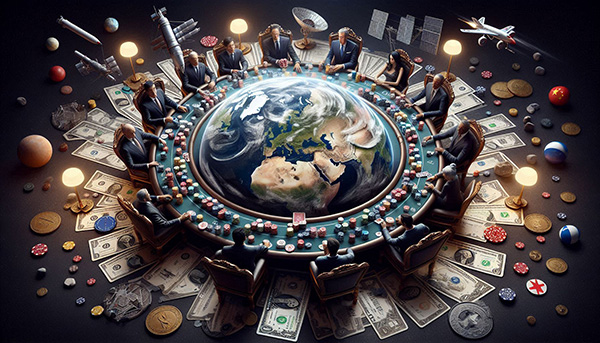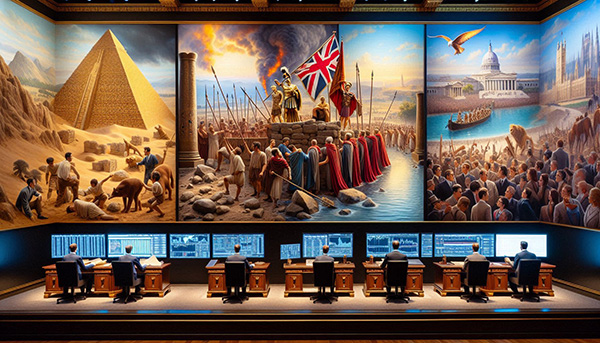By: John S. Morlu II, CPA
Let’s get one thing out of the way: Donald J. Trump is many things — unpredictable, polarizing, occasionally chaotic, often meme-worthy — but wrong about power? Rarely.
When he says, “People want to negotiate when they hold no cards,” he’s not making a political jab; he’s revealing an ancient truth that could outlast every civilization currently pretending to be a democracy.
He’s describing a law older than constitutions, older than trade, older than diplomacy — the Law of Leverage.
It’s the invisible gravity that holds together every relationship, every transaction, every treaty, and every fight for power.
Because whether it’s global trade, romance, or asking your boss for a raise, the world runs on leverage — and most people, bless their delusion, try to bargain like they’ve got a royal flush when all they’re holding is a 7 of hearts, a prayer, and a half-used loyalty coupon.
The Universal Law of the Cards
Here’s the uncomfortable truth:
Negotiation isn’t about fairness.
It isn’t about decency.
It isn’t even about who’s right.
It’s about who can afford to walk away.
You can’t threaten to leave the table if you have nowhere to go.
You can’t bluff a full house when your hand is trembling.
You can’t demand respect when you’re the one desperate for the deal.
Power, in every form, comes down to this: options.
Trump, love him or loathe him, gets this intuitively.
He walks into rooms assuming the deal needs him more than he needs the deal.
He negotiates not from ego (though there’s plenty of that) but from positioning.
That’s why even his enemies find themselves adjusting to his gravity field.
Every effective negotiator — from Cleopatra to Churchill to Musk — operates under this silent equation:
He who holds the options holds the outcome.
It’s the same rule that decides who gets promoted, who gets dumped, and which nations end up at the UN podiums versus IMF bailout lines.
The Global Poker Table: The U.S. vs. Everyone
For decades, the United States hasn’t been at the poker table — it’s been the table itself.
The dollar? The deck.
The military? The casino security.
And global trade? The house rules.
When you issue the world’s reserve currency, you don’t negotiate; you dictate.
Everyone else plays with borrowed chips.
They grumble about the “unfairness” of it all — and then promptly deposit their foreign reserves in U.S. banks.
That’s leverage on steroids.
When America sanctions a country, their currency collapses.
When another nation sneezes, the dollar gets stronger.
That’s not democracy; that’s physics.
China saw this and decided, “We want that seat.”
Enter: the Belt and Road Initiative — loans disguised as friendship bracelets. It was a brilliant move. They built highways, ports, and stadiums across Asia and Africa, and called it partnership. But when the interest payments came due, “partnership” started to sound a lot like “pawnshop.”
Russia, for a while, held Europe’s winter hostage with natural gas — until Europe finally discovered renewable energy, Norwegian pipelines, and thick socks.
Africa, rich with minerals, oil, and rare earths, still lets outsiders print the export invoices. It’s like sitting on gold but renting the shovel.
And the European Union? A committee of cautious intellectuals playing poker with moral arguments and environmental pledges, while others play with drones, data, and debt.
In the end, geopolitics isn’t about ideology — it’s about inventory. Whoever controls the energy, the chips, or the choke points writes the rules.
Everyday Players: The Personal Politics of Power
Let’s bring this down from geopolitics to your office, your relationship, your bank account.
How many people do you know who “negotiate” a raise with emotional essays instead of evidence? Or try to “save” a relationship with tears instead of self-worth? Or “renegotiate” rent with sad stories instead of money?
That’s not negotiation. That’s emotional karaoke.
If you have no alternatives, you have no leverage.
If you have no leverage, you’re not negotiating — you’re appealing to mercy.
The job market doesn’t care about your feelings.
The relationship market doesn’t care about your intentions.
And the financial market doesn’t care about your excuses.
Trump’s advice, stripped of ego and bluster, translates to this:
“Never enter a negotiation you can’t walk away from.”
Build leverage first — then talk.
Or better yet, let your leverage talk for you.
Fun Fact: Leverage Is Humanity’s Oldest Technology
Let’s time travel for a moment:
- Ancient Egypt: Pharaoh didn’t “negotiate” pyramid construction — he owned food, religion, and the afterlife. You want eternal salvation? Move that stone.
- Rome: Julius Caesar didn’t debate democracy — he crossed the Rubicon and made democracy optional.
- Britain: Colonized half the planet under the polite pretense of “trade.” They didn’t ask. They arrived, built a railway, raised a flag, and invoiced your spices.
- The U.S.: Learned from all of them. Didn’t need colonies; just built banks, bases, and broadband.
- Modern Tech Giants: You think you’re the customer? You’re the product. They hold your data, your dopamine, and your digital identity. Try leaving Facebook — it’ll feel like exile.
Leverage evolves.
It used to be land. Then labor. Then oil. Now it’s information.
The power may shift hands, but the principle stays the same:
Whoever controls the system controls the story.
Punchline of the Century
The world’s greatest joke is that people think success is about morality.
It’s not. It’s about math.
Power doesn’t care about righteousness — it cares about ratios.
If you can offer more, produce more, or hurt more, you get more.
You can give the best TED Talk in the world, but if you need funding, the investor still owns your dream.
You can tweet all you want about “justice,” but if your country needs grain or fuel, you’ll end up negotiating at midnight behind closed doors.
And in relationships? The person who cares less always wins the argument.
It’s cruel.
It’s cold.
It’s true.
Negotiation isn’t a dinner party — it’s poker in a burning building.
So, Who Really Holds the Cards?
Let’s review:
- In politics: Whoever controls the energy, food, and currency supply.
- In business: Whoever can say “no” without fear.
- In relationships: Whoever controls emotional access.
- In life: Whoever has built enough options to sleep peacefully.
The powerless always talk about equality.
The powerful talk about timing.
Trump’s phrase isn’t arrogance — it’s a mirror.
Most people want to talk terms before they’ve earned a seat.
They want respect before competence, rewards before leverage, applause before results.
The world doesn’t work that way.
It’s not sentimental. It’s systemic.
Final Thought: Power Speaks Quietly
Trump’s critics often focus on his delivery — the shouting, the nicknames, the chaos.
But strip the noise away and he’s simply saying what emperors, CEOs, and chess masters have always known:
You can’t bargain with reality until you own something it needs.
That’s the heart of all leverage.
The CEO negotiates with investors because she has vision and profit.
The artist negotiates with the world because he has originality.
The nation negotiates because it has resources or influence.
The rest?
They make noise.
They make statements.
They make demands.
But they don’t make deals.
Because when you hold no cards, you’re not in the game — you’re just watching it, mistaking noise for strategy.
And the world, cold and busy, doesn’t clap for spectators.
The Trump Doctrine of Power (Unintentional but Universal)
1. Create scarcity.
Make your presence valuable. People chase what they can’t replace.
2. Control narrative.
Tell your version loudly and consistently until others negotiate around it.
3. Exploit dependence.
Know who needs you more — and never reverse that dynamic.
4. Play long games.
The powerful always think decades ahead. The powerless think about next Friday.
5. Master silence.
When you speak less, your words multiply in weight.
6. Keep cards close.
Transparency is noble; opacity is power.
The Reality Check
Every deal — political, romantic, or business — is a mirror of leverage.
And the moment you forget that, you lose your seat at the table.
Trump, in his own blunt, unapologetic way, is reminding everyone from presidents to waiters:
“Don’t negotiate if you’re desperate.”
In modern terms, it means:
- Don’t ask for respect — build competence.
- Don’t demand equality — build power.
- Don’t beg for fairness — build alternatives.
Because only then will you stop trying to convince people, and start choosing people.
Final moral:
When you have no cards, the smart move is to stop playing poker — and start building your own deck.
That’s how every empire, entrepreneur, and survivor in history made it to the next round.
Because power, in its truest form, isn’t loud.
It’s quiet.
And it always knows it can leave the table.
Author: John S. Morlu II, CPA is the CEO and Chief Strategist of JS Morlu, leads a globally recognized public accounting and management consultancy firm. Under his visionary leadership, JS Morlu has become a pioneer in developing cutting-edge technologies across B2B, B2C, P2P, and B2G verticals. The firm’s groundbreaking innovations include AI-powered reconciliation software (ReckSoft.com), Uber for handymen (Fixaars.com) and advanced cloud accounting solutions (FinovatePro.com), setting new industry standards for efficiency, accuracy, and technological excellence.
JS Morlu LLC is a top-tier accounting firm based in Woodbridge, Virginia, with a team of highly experienced and qualified CPAs and business advisors. We are dedicated to providing comprehensive accounting, tax, and business advisory services to clients throughout the Washington, D.C. Metro Area and the surrounding regions. With over a decade of experience, we have cultivated a deep understanding of our clients’ needs and aspirations. We recognize that our clients seek more than just value-added accounting services; they seek a trusted partner who can guide them towards achieving their business goals and personal financial well-being.
Talk to us || What our clients says about us







